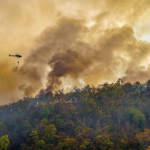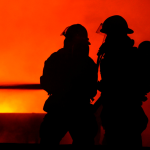As a result of some major industrial fires in BC questions are being raised in the media about who is the Authority Having Jurisdiction (AHJ) for fire safety inspections.
In British Columbia municipalities are required by Section 26 (1) of the Fire Services Act (R.S.B.C.1996) to provide for a regular system of inspection of hotels and public buildings within their jurisdiction. The definition of municipality for the purposes of the Fire Services Act (FSA) includes villages, towns, cities, municipal districts and resort municipalities.
Regional Districts are not municipalities for purposes of the FSA so they are not required to provide fire inspection services.
Historically the Office of the Fire Commissioner (OFC) has defined “public building” as any building except a private dwelling unit. When an industrial plant or complex commercial facility is located within the boundaries of a municipality they are public buildings by definition and the municipality is required to provide for a regular system of inspection.
Although the FSA mandates municipalities to provide for a regular system of inspection it does not require fire departments to do inspections. In most cases municipal councils expect their regular system of inspection obligation to be carried out by their fire department. In some cases councils have contracted out the inspections to third parties. Only in rare cases do municipal councils follow up to ensure their inspection obligation is being fulfilled.
In cases where the fire department has career people dedicated to fire prevention the municipal obligation is usually satisfied. However, approximately 80 % of fire departments in BC are considered volunteer and many lack the expertise or human resources to perform the inspections.
Another complicating factor in determining who is responsible for fire inspections is the location of the property. A good example and one that has been in the news recently is Babine Forest Products which is located on First Nations land outside the Municipality of Burns Lake. First Nations are either self-government or fall under federal jurisdiction so the FSA does not apply and there is no obligation for the Province of BC or local government to conduct fire inspections. The same is true for other federally regulated bodies. The national railways, Corrections Canada and Canada Post are good examples of federal agencies where the province has no mandate to inspect.
The question “Who is the Authority Having Jurisdiction (AHJ)?” is only part of the issue. Another part of the issue is “What level of inspection is required to meet the FSA?”
Fire investigation is another delegated responsibility under the FSA. In this case the Act states the Local Assistants to the Fire Commissioner (LAFC) shall investigate “in a general way” all fires that occur in their jurisdiction. For purposes of the Act the OFC has historically defined “in a general way” to mean that enough information was collected to fill out the Fire Commissioners report form. To my knowledge the level to which the FSA intends fire inspections be performed has never been questioned or defined.
Section 48 (2) of the FSA states “Nothing in this Act absolves a municipality from its duty to enforce a law or regulation relating to a matter under this Act”; therefore, it seems inspections of complex processes and operations are required. However, a Policy of Council establishing the level of service provided may at least limit liability. By making a “pure policy” decision local government can argue that the policy they made was for the purpose of allocating the limited local resources available to them. Of course each local government should seek their own legal advice.
Legal proceedings have shown that the Standard of Care to which a fire department is held for fire suppression will vary depending on circumstance. The courts have determined that a career fire department will be held to a higher Standard of Care than a volunteer department. In determining liability, comparisons between departments with similar circumstances and resources will likely be used to determine the level of care expected by the courts. It is reasonable to assume the same will be true for fire prevention.
It would seem unreasonable to expect that a volunteer or part time fire inspector would be held to the same Standard of Care that is expected of career fire prevention officers but to my knowledge this has never been put to the test.
Municipal councils have many options that can provide support to the fire inspection program. Some of these include but are not limited to:
– Develop “Policies of Council” that determine the level of fire inspection provided
– Provide prevention training programs
– Require volunteers who perform inspections to have some basic fire inspection training
– Hiring fire prevention staff
– Contract out the inspection program to a third party
– Contract out complex inspections to qualified third parties
FireWise Consulting Ltd. offers a variety of inspection services that assist municipalities in meeting their obligations under the Fire Services Act. These include fire inspection training, partial or complete third party inspection services, pre-fire planning and mentoring for local fire inspectors.
If you would like more information about our services please contact us .
(Bob Turley worked for the OFC for twenty five years as an inspector, Regional Fire Commissioner and Deputy Fire Commissioner.)







